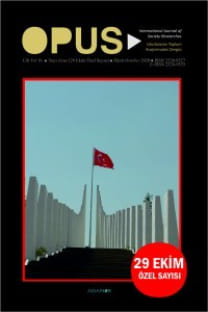Hizmet Öncesi İngilizce Öğretmenleri Neye Hizmet Eder? Eleştirel Pedagojik bir Bakış Açısı
neoliberalizm, otoetnografi, neokolonyalizm, eleştirel pedagoji, hizmet öncesi
What do Pre-service English Teachers Serve? A Critical Pedagogical Perspective
critical pedagogy, pre-service, neoliberalism, autoethnography, neocolonialism,
___
- Adams, T. E., Jones, S. L. H., and Ellis, C. (2015). Autoethnography. Understanding Qualitative Research.Oxford: Oxford University Press.
- Ahiska, M. (2010). Occidentalism in Turkey: Questions of modernity and national identity in Turkish radio broadcasting. IB Tauris.
- Apple, M. W. (2011). Paulo Freire, critical pedagogy and the tasks of the critical scholar/activist.Revista e-curriculum, 7(3), 1-21.
- British Council ve TEPAV. (2015). The state of English in higher education in Turkey. Ankara: Yorum Basın Yayın.
- Chomsky, N. (2012). Democracy and education.Counterpoints, 422, 55-70.
- Fairclough, N. (1989) Language and power. London: Longman.
- Fairclough, N. (1992) Discourse and social change. Cambridge: Polity Press.
- Falzon, C. (2006). Foucault and social dialogue: Beyond fragmentation. London: Routledge.
- Foucault, M. (1972) The archaeology of knowledge. London: Routledge.
- Foucault, M. (1980). Truth and power. In C. Gordon (ed.) Power/Knowledge. Selected Interviews and other Writings 1972–1977. Hemel Hempstead: Harvester Wheatsheaf.
- Foucault, M. (2012). Discipline and punish: The birth of the prison. New York, NY: Vintage.
- Freire, P. (2000). Pedagogy of the oppressed (Trans. M. Bergman Ramos). New York: Continuum.
- Giroux, H. (2002). Neoliberalism, corporate culture, and the promise of higher education: The university as a democratic public sphere. Harvard educational review, 72(4), 425-464.
- Giroux, H. (1984). Marxism and schooling: The limits of radical discourse. Educational Theory, 34(2), 113-35.
- Gramsci, A. (1991) Selections from prison notebooks. London: Lawrence and Wishart.
- Harvey, D. (2007). A brief history of neoliberalism. Oxford :Oxford University Press.
- Laclau, E. and Mouffe, C. (1985) Hegemony and socialist strategy. Towards a radical democratic politics. London: Verso.
- Marx, K. (1968). Preface to a contribution to the critique of political economy. In Karl Marx & Frederick Engels: Their selected works (p. 181-185). New York: International Publishers.
- Marx, K. and Engels, F. [1848]. The communist Manifesto. In Mendel, Arthur P. (ed.)(1961). Essential works of Marxism. New York: Bantam, 13-44.
- McLaren, P. (1988). Schooling the postmodern body: Critical pedagogy and the politics of enfleshment.Journal of Education, 170(3), 53-83.
- Olssen, M., and Peters, M. A. (2005). Neoliberalism, higher education and the knowledge economy: From the free market to knowledge capitalism. Journal of education policy, 20(3), 313-345.
- Pennycook, A. (2002).English and the discourses of colonialism. London : Routledge.
- Pennycook, A. (2017). The cultural politics of English as an international language. London : Routledge.
- Phillipson, R. (2017). Myths and realities of global English. Language Policy, 16(3), 313- 331.
- Rule, P. (2011). Bakhtin and Freire: Dialogue, dialectic and boundary learning.Educational philosophy and theory, 43(9), 924-942.
- Said, E. W. (1979).Orientalism. London: Penguin
- Said, E. E. (1996). Representations of the intellectual. New York : Vintage
- Spivak, G. C. (2003). Can the subaltern speak?.Die Philosophin, 14(27), 42-58.
- ISSN: 2528-9527
- Yayın Aralığı: Aylık
- Yayıncı: ADAMOR Toplum Araştırmaları Merkezi
Ulusal Basın Ekseninde Atatürk Dönemi Öğrenci Hareketleri: Razgrad Hadisesi Örneği
Çalışanın Aşırı Niteliklilik Özelliği İle Örgütsel Sinizm İlişkisinde İyi Oluşunun Aracı Etkisi
Cihan TINAZTEPE, Necmiye Tülin İRGE
Romantik Çiftlerde İdeal-Gerçek Eş Uyuşmazlığı ve İlişkisel Sonuçları
Mantar Yönetim Algısının İş Tatminine Etkisinde Yabancılaşmanın Aracı Rolü
Risk Toplumu Bağlamında Covid-19 Haberlerine Yönelik Bir İnceleme
Milli Görüş Partilerinin Eğitim ve Kültür Programlarının Değerlendirilmesi
Hizmet Öncesi İngilizce Öğretmenleri Neye Hizmet Eder? Eleştirel Pedagojik bir Bakış Açısı
Zafer BAŞ, Ayşegül BAŞ, Ahmet KALAFAT, Bülent DİLMAÇ
Türkiye’de Okul Öncesi Dönemde Matematik Alanında Yapılan Çalışmalara İlişkin Bir İçerik Analizi
Rukiyye YILDIZ ALTAN, Hilal GENÇ, H. Elif DAĞLIOĞLU
